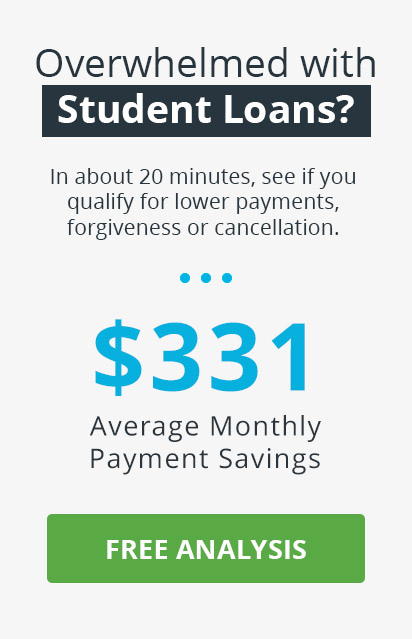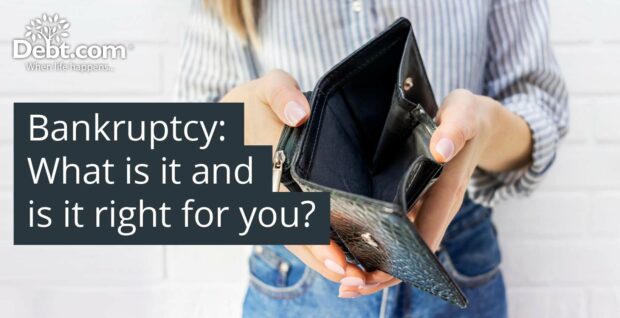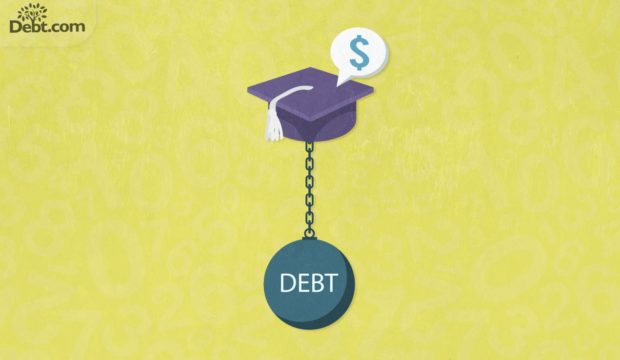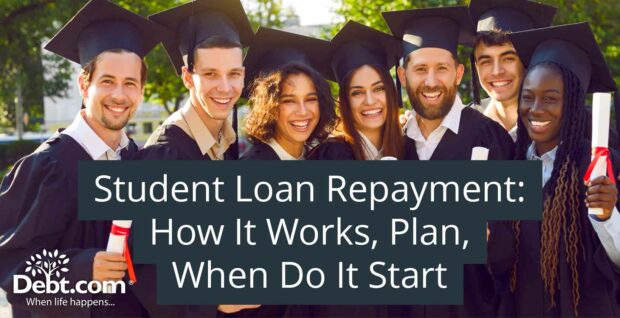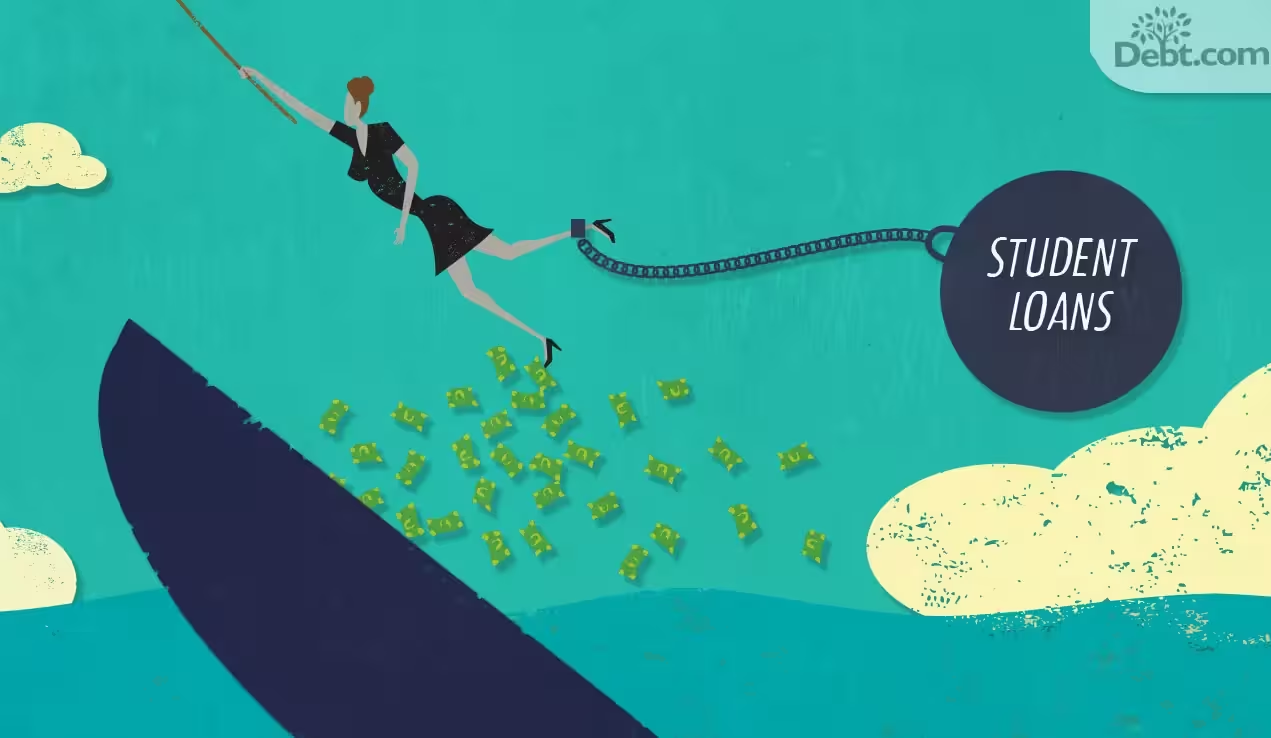
Private student loan borrowers who are completely overwhelmed by debt may wonder if they can file for bankruptcy. There’s long been a misconception that student loans can never be discharged through bankruptcy. But the reality is a bit more nuanced – especially concerning private loans.
In this post, we’ll explore whether insolvent debtors can claim bankruptcy on private student loans, what happens to private student loans in Chapter 7, and how recent developments have changed the outlook for borrowers seeking relief. Let’s dive into the details.
Table of Contents
Understanding the challenge of discharging student loans in bankruptcy
For most people, bankruptcy is a last resort, often pursued after financial hardships like job loss or unexpected medical bills. But when it comes to student loans, it’s more complex than filing and moving on. You may have heard that student loans are non-dischargeable, and while this is primarily true for federal student loans.
Federal and private student loans are treated differently in bankruptcy than other types of debt. Unlike credit card debt or medical bills, student loans in Chapter 7 are only discharged under very specific conditions.
To get these loans discharged, you typically need to demonstrate what’s known as “undue hardship,” a legal standard that’s notoriously hard to meet. The challenge is further compounded by the fact that most borrowers aren’t fully aware of what undue hardship entails, and it requires a lot more than simply showing that you’re struggling to pay.
The undue hardship test and adversary proceeding
You must prove undue hardship to declare bankruptcy on private or federal student loans. This usually involves passing the “Brunner Test,” which has three criteria:
- You cannot maintain a minimal standard of living while repaying the loans.
- Your current financial situation will likely persist for a significant portion of the repayment period.
- You’ve made a good-faith effort to repay your loans.
Let’s break these down a bit more. The first criterion requires you to show that making payments on your student loans prevents you from meeting basic living expenses – rent, food, healthcare, and other essentials. For the second part, you must prove that your financial difficulties are not temporary; they will likely continue long-term, whether due to limited job prospects, a permanent disability, or other enduring issues. Finally, the third part, demonstrating good-faith efforts, means that you’ve attempted to make payments or at least pursued deferment, forbearance, or other repayment options to the best of your ability.
If you believe you meet these criteria, you can file an “adversary proceeding,” a lawsuit within your bankruptcy case, specifically asking for the discharge of your student loans.
An adversary proceeding is a separate process involving providing evidence, possibly testifying in court, and making your case that continuing to carry the student loan debt would cause undue hardship. This applies to private and defaulted student loans that have gone into collections.
Changes and exceptions for private student loans
Recent changes in how courts interpret private loans have made some progress in helping borrowers. Courts have started to distinguish between different types of student loans.
For example, certain private loans used for non-educational purposes or exceeding the actual attendance cost may be more easily discharged. In recent years, there have been instances where private student loans were successfully discharged because they were not used directly for education or were classified differently from federal student loans.
While the general rule is that student loans aren’t automatically included, some private loans have been found eligible for discharge when they did not meet the legal definition of an “educational benefit.”
This includes loans for study abroad or those provided by institutions not accredited by the Department of Education. Courts are increasingly willing to examine the details of these loans, particularly in cases where they seem more akin to personal loans rather than educational loans.
Bankruptcy and federal student loans: what are the differences?
Due to stricter standards, discharging federal loans over private loans is generally more challenging. Federal student loans are backed by the government, which often means they come with various repayment and deferment options designed to prevent you from defaulting.
This is partly because federal loans often offer income-driven repayment plans, forgiveness programs, and forbearance options that private lenders don’t.
Federal loans have more protections and repayment alternatives, which make it harder to convince the court that you’ve exhausted all possible options and are left with no recourse but to file for bankruptcy. Borrowers considering this route should know that the bar for discharging federal student loans is significantly higher because of these options.
Lenders like Navient, Sallie Mae, and Great Lakes are well-known for issuing private student loans. Borrowers often ask: Can you file bankruptcy on Navient student loans? or Sallie Mae student loans? The answer largely depends on your case and whether you meet the undue hardship standard. For example, loans from Navient or Great Lakes used for things other than education or were issued directly to the student and not through an educational institution could be argued as dischargeable.
Filing bankruptcy on defaulted student loans and loans in collections
Loans in collections can be part of your bankruptcy case, but like any other student loans, you still need to prove undue hardship to have them discharged. It is essential to understand that defaulted loans may incur additional interest, fees, and penalties that further complicate your financial situation.
This is the same for private loans that have been refinanced. Refinancing doesn’t make a loan easier to discharge. The underlying loan remains classified as a student loan, which means it’s still subject to the exact undue hardship requirements.
Why are student loans not dischargeable?
Laws were designed to protect the federal investment in education.
Congress intentionally made it difficult to discharge student loans to maintain the viability of the federal student loan program, which was crucial to expanding access to higher education. The high barriers to discharge mean that student loans are considered a more stable form of debt, benefiting lenders and the government.
However, as more borrowers face mounting financial pressures, there has been a push to reconsider these laws. Some lawmakers and consumer advocates argue that the current rules are outdated, especially as the cost of education has skyrocketed, and the burden of student loans has led many people to experience severe financial distress.
Suppose you’re in a state like Illinois, Indiana, Kentucky, Michigan, Minnesota, Missouri, or Ohio. In that case, the rules remain the same, but state-specific guidance from an attorney can help determine your options. Each state may have specific exemptions that could impact your bankruptcy case and the protection of your other assets.
Does filing bankruptcy affect student loans?
Unfortunately, simply filing for bankruptcy isn’t enough to erase student loans. The bankruptcy process can clear other debts, such as credit cards or medical bills, which might make repaying student loans easier, but clearing student loans themselves requires extra legal hurdles.
Filing for bankruptcy primarily affects your ability to manage other debts and can provide breathing room while you sort through your financial challenges.
For instance, eliminating other unsecured debts might make it more feasible for you to keep up with student loan payments, but it’s not a cure-all for borrowers hoping to wipe out their student loans entirely.
In some cases, reducing other debts can indirectly make it easier to manage student loans, primarily if you can focus your available income on tackling those loans after other obligations have been reduced. However, this doesn’t change the fact that student loans require an adversary proceeding to be considered for discharge.
Alternatives to bankruptcy for private student loans
If proving undue hardship seems unlikely, consider other options. Negotiating with your lender can sometimes result in a modified payment plan. This can be particularly useful for private student loans, as private lenders may have more flexibility than federal programs. Refinancing can also help if you can secure a lower interest rate. This option is especially helpful if your credit has improved since you took out the loans, as you might qualify for a significantly lower rate.
While not an ideal solution, exploring forbearance or deferment options might give you temporary relief if your student loans default or are collections.
Forbearance can allow you to pause payments, though interest typically continues to accrue. Student Loan Deferment may also allow you to delay payments, and in some cases, you may not accrue interest if you qualify for a subsidized deferment.
Debt consolidation is another possibility, especially if you have multiple private loans with different interest rates. A single consolidated loan might be easier to manage. However, it’s essential to consider that consolidating loans may reset the repayment term and potentially cost you more in interest over the long haul. Working with a credit counselor or a financial planner can also help you explore all possible options and find the one that best suits your situation.
Common myths about discharging private student loans in bankruptcy
Myth: “All student loans are non-dischargeable in bankruptcy”
Many people believe that student loans are universally non-dischargeable in bankruptcy. While it’s true that discharging student loans is more complicated than discharging other types of debt, it’s not impossible. Private loans can be more amenable to discharge, primarily if they are used for expenses other than tuition or fees related directly to education. Each case is unique, and recent court decisions have opened the door for more successful discharges of private student loans.
Myth: “It’s impossible to prove undue hardship”
Another common myth is that proving undue hardship is impossible. While challenging, there are documented cases where borrowers have successfully demonstrated undue hardship. The key is to provide thorough documentation of your financial situation, including proof of income, necessary living expenses, and evidence that your financial difficulties are unlikely to change. If a borrower can meet the three criteria of the Brunner Test, there’s a real chance of having student loans discharged.
Notable legal cases influencing student loan discharge
Several legal cases have set important precedents in student loan discharge. For example, in “In re Tetzlaff,” the court allowed the discharge of private loans where the borrower could not show a reasonable likelihood of increased income. Additionally, “In re Rosenberg” is a significant case where a federal judge discharged over $200,000 in private student loans, ruling that the borrower met the undue hardship requirement. These cases illustrate that, while challenging, discharging student loans is achievable under the right circumstances.
Steps to take before filing for bankruptcy on student loans
If you’re considering filing for bankruptcy to discharge your student loans, there are several steps you should take:
- Consult a bankruptcy attorney: Working with an attorney specializing in student loan issues is crucial. An experienced attorney can help determine whether you meet the undue hardship standard and guide you through the process.
- Gather documentation: You must provide extensive evidence of your financial situation. This includes pay stubs, tax returns, living expenses, and a record of any payments made toward your loans. This documentation will be critical in proving undue hardship.
- Explore alternatives: Before proceeding with bankruptcy, explore options like income-driven repayment plans, refinancing, or negotiating directly with your lender. Courts are more likely to rule in your favor if you can show that you’ve exhausted all other avenues.
- Prepare for an adversary proceeding: Understand that discharging student loans requires an additional legal step called an adversary proceeding. This is a lawsuit against your lender within your bankruptcy case. Preparing for this involves collecting all necessary documentation and preparing to testify in court.
Filing an adversary proceeding
An adversary proceeding is crucial to trying to discharge student loans through bankruptcy. This separate lawsuit is filed within the bankruptcy court and involves presenting evidence to prove undue hardship. During the proceeding, you will be required to testify about your financial circumstances, and your lender will be able to challenge your claims.
To improve your chances of success:
- Be honest and thorough: Courts appreciate transparency. It’s important to be honest about your financial challenges, even if they make your situation look dire.
- Provide evidence: Gather every piece of evidence that supports your case. This includes medical records if you have health issues that affect your ability to work and proof of any income and essential expenses.
- Work with an attorney: An experienced bankruptcy attorney can help you navigate the process, develop a compelling argument, and present your case effectively.
Give us 20 minutes. We’ll give you a personalized plan to reduce your student loans – possibly by hundreds a month.
State-specific information on filing bankruptcy on student loans
Alabama
In Alabama, borrowers seeking to discharge student loans through bankruptcy must follow federal guidelines, meaning they must prove undue hardship to have their student loans discharged. State-specific exemptions may help protect other assets during the bankruptcy process. Alabama law allows certain exemptions for properties and personal items, which could impact the overall outcome of a bankruptcy case.
Alaska
Alaska follows federal bankruptcy laws regarding student loans. Borrowers must demonstrate undue hardship through an adversary proceeding to have any chance of discharging private student loans. Alaska’s specific state exemptions may also apply, providing certain protections for personal property or assets.
Arizona
Arizona residents must prove undue hardship to discharge student loans. State-specific exemptions may apply to other personal assets in a Chapter 7 or Chapter 13 bankruptcy filing. Arizona offers a homestead exemption, which might help borrowers protect their primary residence during bankruptcy.
Arkansas
In Arkansas, the bankruptcy process for student loans requires proving undue hardship under the Brunner Test. Borrowers should consult a local attorney to understand state-specific nuances, as Arkansas law exempts personal property and retirement accounts.
California
California borrowers seeking relief from student loans through bankruptcy must meet the federal undue hardship criteria. Legal advice from a bankruptcy attorney is highly recommended due to California’s specific regulations regarding exemptions. California provides two bankruptcy exemptions, System 1 and System 2, which allow borrowers some flexibility in protecting assets.
Colorado
Colorado follows federal law for discharging student loans in bankruptcy. Borrowers must prove undue hardship, and exemptions for other debts and assets may vary based on state law. Colorado has an exemption for personal property and vehicles up to a certain value, which can be advantageous during bankruptcy.
Connecticut
In Connecticut, discharging private student loans through bankruptcy requires proving undue hardship. Borrowers should be aware of state-specific exemptions that may impact their filing. Connecticut provides exemptions for certain retirement accounts, which could help borrowers protect some of their long-term savings.
Delaware
Delaware adheres to federal guidelines for discharging student loans in bankruptcy. Proving undue hardship is necessary; state exemptions may help protect other assets. Delaware’s exemption laws also allow for the protection of particular personal property and household goods.
Florida
Florida borrowers must prove undue hardship to discharge student loans in bankruptcy. State-specific exemptions can help protect assets like homes or personal property. Florida has a generous homestead exemption, which is particularly beneficial for protecting equity in a primary residence.
Georgia
In Georgia, borrowers must demonstrate undue hardship through an adversary proceeding to discharge student loans. State exemptions may vary, offering some protection for assets such as homes, vehicles, and household items. Consulting a local bankruptcy attorney is advisable to understand the full scope of Georgia’s exemption laws.
Hawaii
Hawaii follows federal standards for student loan discharge in bankruptcy. Proving undue hardship is necessary, and there may be state-specific protections for other types of assets. Hawaii also has specific exemptions for homes, vehicles, and personal property, which can be essential during a bankruptcy case.
Idaho
Idaho borrowers must prove undue hardship to discharge student loans in bankruptcy. It is recommended that they consult with a local attorney to understand Idaho’s specific bankruptcy exemptions, which include protections for homesteads and other personal property.
Illinois
In Illinois, borrowers seeking to discharge private student loans through bankruptcy must demonstrate undue hardship. State-specific exemptions may help protect certain assets during the process. Illinois also has exemptions for equity in a primary residence and various personal items, which can be instrumental during a bankruptcy case.
Indiana
Indiana follows the federal undue hardship standard for discharging student loans. Borrowers should seek state-specific advice to understand which assets can be protected. Indiana provides specific exemptions for real estate and retirement accounts, which can be helpful during bankruptcy proceedings.
Iowa
Iowa borrowers must prove undue hardship to discharge student loans in bankruptcy. State-specific exemptions, including a homestead exemption and protections for certain personal property, may help protect other assets during the process.
Kansas
Kansas adheres to federal guidelines for student loan discharge in bankruptcy. Proving undue hardship is necessary, and state-specific exemptions may apply. Kansas offers a homestead exemption and protections for certain property types, making understanding your rights during bankruptcy critical.
Kentucky
In Kentucky, borrowers must prove undue hardship to discharge student loans through bankruptcy. State-specific exemptions, such as a homestead exemption and personal property protections, may help protect certain assets. Consulting a local bankruptcy attorney is recommended.
Louisiana
Louisiana follows federal bankruptcy laws regarding student loans, requiring borrowers to demonstrate undue hardship. State exemptions may protect some personal assets, including homesteads and certain vehicles, which can be advantageous during bankruptcy.
Maine
Maine borrowers seeking to discharge student loans in bankruptcy must prove undue hardship. State-specific exemptions, including exemptions for real property and personal items, may help protect assets during the process.
Maryland
Maryland follows federal guidelines for discharging student loans in bankruptcy, requiring proof of undue hardship. State exemptions may offer some asset protections, such as household goods, vehicles, and a limited homestead exemption.
Massachusetts
In Massachusetts, borrowers must prove undue hardship to discharge student loans in bankruptcy. Consulting with a local attorney can help navigate state-specific exemptions, which may include protections for primary residences and certain retirement accounts.
Michigan
Michigan borrowers seeking student loan discharge in bankruptcy must demonstrate undue hardship. State-specific exemptions may apply to protect assets like homes and vehicles, which can be beneficial during bankruptcy.
Minnesota
Minnesota follows federal standards for discharging student loans through bankruptcy, requiring proof of undue hardship. State exemptions, including a homestead exemption and protections for personal property, may help protect other assets during the process.
Mississippi
In Mississippi, borrowers must prove undue hardship to discharge student loans in bankruptcy. Consulting a local attorney can help understand state-specific protections, such as exemptions for homesteads, vehicles, and certain types of personal property.
Missouri
Missouri follows federal bankruptcy laws for student loans, meaning borrowers must demonstrate undue hardship. State-specific exemptions may help protect personal assets, including homesteads and various forms of personal property.
Montana
Montana borrowers must prove undue hardship to discharge student loans in bankruptcy. State-specific exemptions, including exemptions for homesteads and household goods, may protect other assets during the process.
Nebraska
Nebraska adheres to federal guidelines for discharging student loans in bankruptcy. Proving undue hardship is necessary, and state-specific exemptions may apply to protect certain assets, such as a homestead exemption and retirement accounts.
Nevada
Nevada follows federal standards for student loan discharge, requiring proof of undue hardship. State exemptions may protect certain assets during bankruptcy, including homesteads and household goods.
New Hampshire
In New Hampshire, borrowers seeking to discharge student loans must prove undue hardship. State-specific exemptions, such as household goods and a homestead exemption, may help protect assets during bankruptcy.
New Jersey
New Jersey borrowers must demonstrate undue hardship to discharge student loans in bankruptcy. State-specific exemptions may protect assets, including homes and personal property.
New Mexico
New Mexico follows federal bankruptcy law for discharging student loans. Borrowers must prove undue hardship, and state-specific exemptions may apply to other debts, including protections for homesteads and vehicles.
New York
In New York, borrowers must prove undue hardship to discharge student loans in bankruptcy. Consulting with a local attorney can help understand state-specific protections, including exemptions for homes and personal property.
North Carolina
North Carolina follows federal guidelines for student loan discharge, requiring proof of undue hardship. State-specific exemptions, including homesteads and personal property protections, may help protect other assets during the process.
North Dakota
North Dakota borrowers must prove undue hardship to discharge student loans through bankruptcy. State exemptions may protect certain assets, such as homesteads and household goods.
Ohio
Ohio follows federal bankruptcy law regarding student loans, meaning borrowers must demonstrate undue hardship. State-specific exemptions, such as homes, vehicles, and personal property, may protect assets during the process.
Oklahoma
Oklahoma borrowers seeking to discharge student loans must prove undue hardship. Consulting with a local attorney can help navigate state-specific protections, including exemptions for homesteads and retirement accounts.
Oregon
Oregon follows federal guidelines for discharging student loans in bankruptcy. Borrowers must demonstrate undue hardship, and state-specific exemptions may apply, including protections for homesteads and personal property.
Pennsylvania
In Pennsylvania, borrowers must prove undue hardship to discharge student loans in bankruptcy. State-specific exemptions may protect certain assets, including homes and personal property.
Rhode Island
Rhode Island follows federal standards for discharging student loans in bankruptcy, requiring proof of undue hardship. Consulting with a local attorney is recommended to navigate state-specific exemptions that may protect personal property.
South Carolina
South Carolina borrowers must prove undue hardship to discharge student loans in bankruptcy. State-specific exemptions, including a homestead exemption and protections for household goods, may help protect personal assets.
South Dakota
South Dakota follows federal bankruptcy guidelines for student loan discharge. Proving undue hardship is necessary, and state-specific exemptions may apply, such as protections for homesteads and personal property.
Tennessee
In Tennessee, borrowers seeking to discharge student loans must prove undue hardship. Consulting a local attorney can help understand state-specific protections, including homesteads and household items exemptions.
Texas
Texas follows federal guidelines for discharging student loans in bankruptcy, requiring proof of undue hardship. State-specific exemptions may help protect assets like homes or vehicles, particularly given Texas’s generous homestead exemption.
Utah
Utah borrowers must prove undue hardship to discharge student loans in bankruptcy. State-specific exemptions may apply to other personal assets, such as household goods and retirement accounts.
Vermont
Vermont follows federal guidelines for discharging student loans, requiring proof of undue hardship. State-specific exemptions may protect assets, including homesteads and personal property.
Virginia
Virginia borrowers must demonstrate undue hardship to discharge student loans in bankruptcy. State-specific exemptions, including protections for homesteads and vehicles, may help protect certain assets during the process.
Washington
Washington state follows federal guidelines for student loan discharge, requiring proof of undue hardship. State-specific exemptions may apply to protect assets, such as homes and personal property.
West Virginia
West Virginia borrowers must prove undue hardship to discharge student loans in bankruptcy. Consulting a local attorney can help understand state-specific protections, such as homesteads and personal property exemptions.
Wisconsin
Wisconsin follows federal standards for student loan discharge in bankruptcy, requiring proof of undue hardship. State-specific exemptions may protect assets, including homes, vehicles, and personal items.
Wyoming
Wyoming borrowers seeking to discharge student loans must prove undue hardship. State-specific exemptions, including homesteads and household goods protections, may help protect certain assets during the process.
FAQs on private student loan discharge in bankruptcy
Yes, it is possible to discharge part of a private student loan if you prove that partial discharge is necessary to alleviate undue hardship. Courts may sometimes rule that only a portion of the loan is dischargeable based on your ability to repay.
Filing for bankruptcy will have a significant negative impact on your credit score. A Chapter 7 bankruptcy can stay on your credit report for up to 10 years, while Chapter 13 remains for 7 years. However, discharging insurmountable debt can provide a path to rebuild your credit in the long run.
If you are unemployed, you can negotiate with your private lender for a temporary suspension or reduced payment plan. However, unemployment is not a reason for automatic discharge in bankruptcy; you would still need to prove undue hardship.
The bottom line
Discharging private student loans through bankruptcy is difficult but possible. If you’re struggling with private student loans, consult a bankruptcy attorney to understand if you might meet the criteria for undue hardship.
Recent developments have made it more feasible for some borrowers to find relief, but the process is still complicated. If you ask why bankruptcy doesn’t clear student loans or what happens to student loans in Chapter 7, know that your options depend largely on your circumstances and willingness to take on the legal battle.




